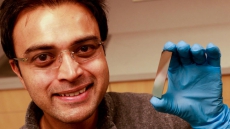WASHINGTON — We may be the Internet generation. But we don't know much about how it works.
A new Pew Research Center survey released Tuesday found most people can recognize Microsoft founder Bill Gates and know that hashtags belong in tweets, but are confused about whether having a privacy policy means that a company actually keeps consumer information confidential.
The results underscore what many techies say is a growing problem for the U.S.: a generation reliant on the convenience that technology brings, but with little understanding of the risks of conducting nearly every transaction using zeroes and ones.
Aaron Smith, senior researcher at Pew and author of the report, said he thought it would be interesting for policy makers and tech designers to find what knowledge gaps existed in modern life.
"Just because people use these gadgets a lot doesn't necessarily mean they know everything about how they work and where they came from," he said.
The 17-question quiz is available online at www.pewinternet.org/quiz/web-iq-quiz/ .
Not surprisingly, people under 30 seemed to do better on some of the questions than older Internet users, such as knowing what a "Wiki" or "captcha" is. But young or old, only about 6 in 10 Internet users understood that "net neutrality" refers to the equal treatment of digital content by service providers. The Federal Communications Commission is considering whether it should regulate the broadband industry more aggressively to prevent providers from playing favourites among content sites like Google, YouTube, Amazon or Netflix.
Another area where age didn't seem to matter was the false assumption that the existence of a privacy policy means that a company keeps the data it collects on consumers confidential. More than half — 52 per cent — of Internet users thought that was the case, whereas privacy policies often explain that a company reserves the right to sell a person's information to advertisers or other third parties.
Three-fourths of people surveyed thought the "Internet" was the same thing as the "World Wide Web." The Internet refers to the infrastructure that uses specific protocols to connect various networks; the web is one application that uses that architecture to share information using web pages.
The online survey was conducted Sept. 12-18 among a sample of 1,066 adult Internet users 18 years of age or older. The survey was conducted by the GfK Group using KnowledgePanel. Sampling error was plus or minus 3.2 percentage points at the 95 per cent level of confidence.





